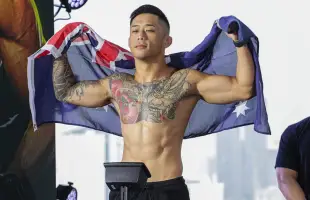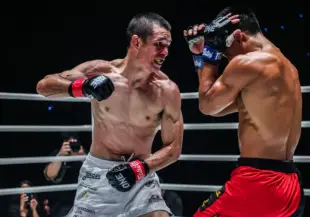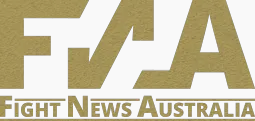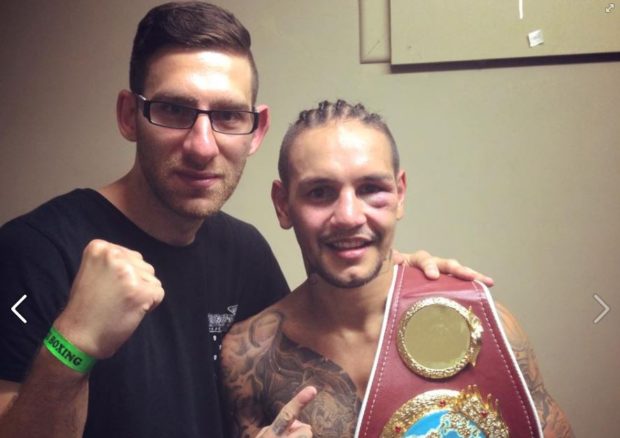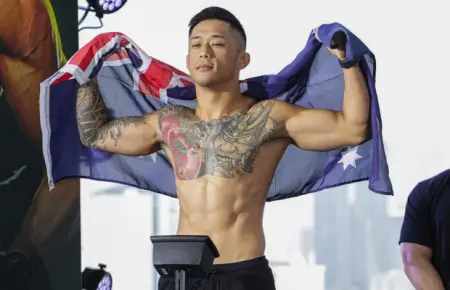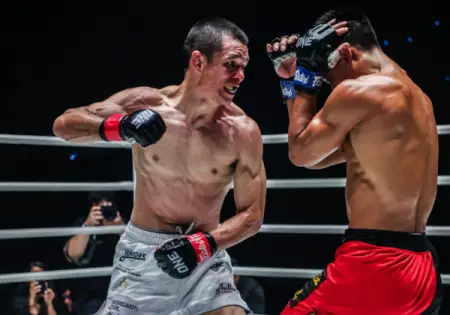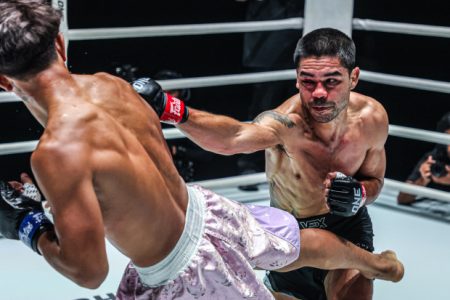It’s strange. I have always possessed the fortitude to chase the seemingly impossible, yet I’m consistently startled at the opportunities the fight game has accorded me. As I write this, I’m packing for Hong Kong. Fifth trip to this amazing business hub. Boxing has taken me to three Olympic Games, over 20 countries, and seen me collaborate with many of my childhood heroes.
At 33, they consider me a “young” manager, a fresher face in an industry saturated with older middle-class figures behind the scenes. But I am truly a grizzled veteran. 16 years in the management game. People like me aren’t supposed to last a year.
I’m not a trust fund baby “playing” boxing management, or an established, cashed-up millionaire crossing over to a new endeavor. But knowledge is power. And so I’ve prided myself on pushing myself to the limit to improve my industry IQ. It’s my only chance to continue surviving and advancing.
Boxing has always been ingrained in my blood. My father was a relatively modest professional pugilist in the early 60s, and later developed into a solid trainer in Victoria, Australia. The first fighter’s name I heard was not Roberto Duran, Mike Tyson, or “Sugar” Ray Leonard. It was the talented Indigenous/Australian boxer Graeme Brooke, my eldest brother’s idol.
Anybody that met my dad during my upbringing will remember how intimidating and hard-nosed he was. We were bred tough. But despite learning the fundamentals, I was never gonna become a fighter. I had other aspirations. Writing. Playing Aussie Rules. Conquering NBA JAM! at the Arcade! Furthermore, my mother certainly would never approve. I always think about the families. We take for granted that our loved ones are coming home. But the dangers are real. And the anguish is tough to shake. I’ll touch on this later.
Back to writing. The World of Boxing Magazine accorded me an opportunity at age 11 to contribute amateur boxing results. That officially launched my journalistic career. Writing has been my therapy, my avenue to effectively express myself. It tempered me. Gave me focus. And tweaked me from a foolish, street-minded pre-teen to a responsible young man. By 17, I was contributing to almost a dozen publications and countless thriving websites in the Dot-com era. In mid-2001 I’d launch my own website, Fighter Network (Later to re-establish in 2005 following a break). It forever changed my destiny.
I added a “Boxers Available For Fights” section to the website as a final interactive touch. Remember, this is before social media. MSN or ICQ were the main bonafide chatting outlets. Within days, the emails starting pouring in. The catch? Most the people wanting to be listed were absolute trainwrecks. Either unreliable, washed-up, or irrational. But there were good apples. And the management seed was planted when boxers from Uganda, Panama, and Guyana began asking for extra assistance in exchange for granting me management rights. I dived in with no reservations. It didn’t seem real. We were interacting via email, so nobody knew my age. I had a few dollars from website sponsors which I immediately sent via Western Union to the boxers. Nothing too flash. 100 bucks a pop, something like that. Excitement brewed.
I brokered my first deal and thought I was a legitimate boy wonder. I’d read how the great matchmaker Don Majeski was crafting deals in his youth, and was already thinking of the press clippings. My cockiness was checked when my Ugandan fighter encountered visa troubles. Several sleepless nights calling the embassy nonstop fortunately resolved the situation. But there was further humbling. The boxer fought bravely but had seen better days. He was soundly defeated and never fought again. My 10% contractual payment ($500) softened the blow. That is, until a week later when the phone bill arrived. My mother screamed my name, “MICHAEL!”. Never a positive sign. $1800 in international calls. My heart sank.
That should’ve decimated me. But I persisted despite the ever-growing roadblocks. See, earlier that year my father assisted a visiting boxer in the corner. Ahmad Popal. In the midst of a spirited contest he was winning, Popal was suddenly rocked, stumbled with his opponent to the canvas, and never woke up. Gone. Aged 29. It was earth-shattering. My father fell to pieces thereafter, a broken man. Eternally blaming himself despite a coronial investigation declaring otherwise. He turned to the bottle. His personal woes spilled over to fallouts with numerous stalwarts of the local industry. Nobody in Victoria was going to give his son an opportunity. I was essentially blackballed.
A key component to life is learning to go around the storms. But sometimes you have no option but to march forward with a Cool Runnings Take-No-Crap-From-Nobody mentality. I had an ever-growing chip on my shoulder. I studied fighters, styles, records, rankings, fight footage, whatever was available to me. Patterns started emerging. There was various successful methodologies to developing fighters, building their brand. I yearned for my shot. Reputable Australian trainers Craig Christian and Billy Hussein, and WBO Supervisor Danny Leigh were among the few to identify my potential and back my perspectives. The jobs were too intermittent though and only a minor step toward creating a future.
Much of my future was foolishly banking on my investments in Guyana. I had partnered with my buddy Carwyn Holland to co-manage a few Caribbean boxers, including towering bantamweight Leon Moore. Leon was a mega-talented kid but always appeared to be out of funds. I’ll never forget the “kidnapping” call demanding a $10,000 USD ransom for his safe return. Leon forgot to hide his caller ID though. Busted! Despite his character failings, Leon climbed to #5 in the World Boxing Council (WBC) world ratings. That’s when long-time US matchmaker Chris Middendorf recommended I talk with award-winning manager Cameron Dunkin. Cameron handled three world champions at the time, and possessed (and still does) one of the strongest management stables in the sport.
Cam and I immediately clicked. He specialised in scouting the amateur ranks, and was pleasantly surprised that I possessed the same passion. Leon became a footnote as we continued talking about the boxing talent on offer at the upcoming Beijing Olympics. I’ll never forget the call. It was mid-May 2008, 2AM, thereabouts. Cameron called to gauge my interest in venturing to Beijing to officially scout the athletes and negotiate. Fate was knocking. I never asked if I was going to make a cent. Literally didn’t give a f**k. Time to “Lose Myself” and never look back.
My notes were ridiculously detailed. I’m assessing my breakdowns for the middleweight (75KG) division now, and find over 70 handwritten pages detailing fighters we eventually signed in Matt Korobov and Alfonso Blanco, and others like current Super Middleweight world champ and Olympic Gold Medalist James DeGale, ill-fated Irishman Darren Sutherland, and Cuban stylist Emilio Correa.
Five days before my scheduled departure, a severe Anaphylactic Shock almost scheduled me for a very different departure. With my throat rapidly constricting and my heart thumping erratically, I kept telling myself that I wouldn’t be denied my Beijing dream. I rushed into the hospital and was quickly hooked to a trio of drips within 60 seconds. The constriction faded away. My heart settled. The Nurse’s words, “Five minutes from death” didn’t register till almost a month later. The next day, a drip prodded near my left bicep was hastily removed. I felt strong tingling sensations as blood sprayed out my arm. The nurses swiftly bandaged my bicep, but something felt amiss. I ignored the anguish. Never told Cameron a thing. That shit would be too risky. I hardened up and boarded for Beijing days later. Destiny!
My biggest concern — reaching the athletes — was alleviated the opening day. I had touched base with several national team coaches and fighters before the Games, and that, coupled with the extraordinarily lax security measures, made for trouble-free access. My focus remained unbreakable. While friends visiting were off watching basketball games, hitting the nightspots, or climbing The Great Wall, I remained fixated on the task at hand and savored each moment.
I returned home fueled by the experience. Once the adrenaline wore off though, my body crashed. The shock left my immune system in a very weakened state. Nevertheless, I positively strutted into the gym for a workout, perhaps feeling inspired by the Olympians we had just signed. As soon as my left jab contacted the heavy bag, I dropped in agony. The shooting sensations in my bicep were beyond any pain ever experienced, including a broken orbital bone. I booked to see a specialist the following day. A four centimetre blood clot was discovered in the bicep. Undoubtedly compounded by the decision to fly following the drip mishap. The 18-month recovery process was mentally torturous, but no regrets. Do whatever it takes.
I am forever indebted to Paul “Showtime” Fleming (Whom ironically, is my reason for venturing to Hong Kong), a sublimely talented Indigenous/Australian Olympian. Paul was the sole Australian I inked in China, and our deal crafting a promotional agreement with powerhouse Top Rank, and his early career development rocketed my management services to another stratosphere in my homeland. I handle 16 Australian-based fighters nowadays (23 total), and everything developed from the momentum of guiding Fleming. The old adage “Never fall in love with your fighters” doesn’t apply to him. I love the kid. His faith, loyalty, and belief is second to none. He’s a lazy f**ker, though.
There’s so many beautiful memories over the years, but the standout is the night a warrior named Erin McGowan captured the WBO World Lightweight title in Perth. My first world champion. Everything about that night. She was an artist inside the ropes, boxing brilliantly on cue to every instruction master trainer Billy Hussein uttered. The emotion in the ring was overflowing when the decision was announced. Erin wasn’t meant to be a world champion at anything. A mother at 17, the deck stacked heavily against her, she found boxing as a salvation, and gradually evolved into a disciplined, highly-skilled ring tactician.
Boxing gives hope to the underdogs. I feel morally conflicted sometimes working the job because you see the undeniable effects swapping blows for a dollar has on individuals long-term. But I also see the artistry, the nuances required to be an elite operator. And furthermore, the way it leads to the betterment of people’s lives.
There’s no 9-5, Monday to Friday work structure in fight management. Not in this business. You’re 24/7. The challenge is balancing the duty with your personal life. You may be chilling on a boat, feeding your girl grapes, when suddenly a dire situation presents itself and you’re forced to change gears. Then there’s time zones. Adjusting. Traveling. 4AM calls. It’s imperative you have an understanding partner and a supportive structure around you.
I’ve near starved to death in Townsville after a shady promoter double-crossed me, had my life threatened numerous times, been shafted, misled, slandered, and struggle with anxiety leading into major fights, but one thing rings true. I would do it all over again.
And I’m hungrier than ever. I still feel energized and motivated; with one difference. I’m at peace. Finally. No chip on these shoulders anymore.
Mike Altamura is the reigning World Boxing Organization Asia Pacific Manager of the Year. He may be reached at mikealtamura83@gmail.com
